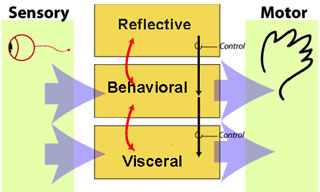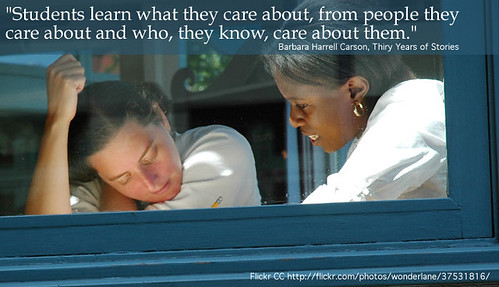
The lizard brain is out to get you! This is the message I remember learning during the Academy of Instruction facilitated by Steve Ramirez and Wendy Chalk of
Life Long Learning Associates. Whenever I have heard brain research I have continued to hear that message. Based on current scientific understanding the fight or flight reaction is one of the earliest to evolve and whenever fear, tension, anger or aggression kick in our lizard brain takes over and the higher order thinkings skills like reason, evaluation, synthesis and analysis are shut down. Therefore, (and this is what the folks say) our classes need to be free of all these stressors in order to create a learning environment that is suitable for higher order upper/frontal brain thinking. Please forgive me if my details are fuzzy, but the pull back and the big picture is clear. Create a warm, safe cozy environment and learning happens.
I am certainly not against this, and there certainly has to be an environment where innovation is valued and people feel safe to express wild, crazy and new ideas. This is probably best achieved by the warm inviting environment, but I ask myself what if we are all wrong!
Is emotion bad in education, in learning, in decision making, in thinking? We talk about our subjects as ideas we love. Memes catch on not because they are actually rational but because they feel right. Often we decide first and then reflect and find the reasons later. I bought a Creative Zen a few months back. On paper it is in all ways better than an iPod Nano that it is competition for, but still I want the iPod. Why, because it appeals to my emotions. Why was it that those students that kind of didn't fit in with the others, kind of were not the best and brightest, but clearly capable, why did they come into my room before school and ask what we were going to do in class. Something connected emotionally. Why have I had so many former students come to me and say: "Oh, I loved you, but I hated your class" Because of a connection. Why did it always bug me when they said this? Because I was emotionally attached to the curriculum I had develeoped.
What prompted all this? The prologue of
Emotional Design by Donald A. Norman. He is a cognitive scientist studying how emotions affect decision making. And actually has a new perspective for me. He states that often our lizard brain is very adept at making the snap judgement about whether something is good or bad, safe or dangerous. Then our reflective brain is able to come up with the reasons for it. The reflective brain is able to then push influence down onto the behavioral brain.

This reminds me of a History Channel show I watched a few weeks ago regarding the training of Navy Seals, they are placed not in a cozy easy environment, but in one of the highest stress environments that can be inflicted on people that you want to survive. This set of stresses helps the trainess learn to control the gut reactions so they don't shoot friendlies, or allies. It helps them supress the panic but still make lightning fast judgements (based on the visceral assessment of safe or dangerous)
What does this mean for the classroom? I don't know if I know? Would my classroom always be one of cozy marshmallows and rainbows, and rose colored glasses? I don't think so. I think there is a place for the kind of focus that happens when there is a high stakes deadline that is just a little to short for comfort. Both climates have a place in the classroom. There is certainly a benefit and a place for a low stress welcoming safe environment, but also a time for the focus that only stressors can bring.
Finally, what does it mean. It means emotionally connected education. No matter what we might say. Education is about emotion. I taught what I did because I wanted students to learn to value those things. There was a clear affective objective in what I did and in what I think we all do. We don't teach kids to read only because we want them to be able to get a job, but because we want them to love reading. We don't teach kids about bacteria, or moss, or DaVinci only because the somehow '
should' know about them, but also because we want them to have a sense of wonder about the world.
images:
www.projectgutenberg.org
www.amazon.com
http://www.mprove.de/script/04/nng/expectationdesign.html













![Reblog this post [with Zemanta]](http://img.zemanta.com/reblog_e.png?x-id=caa1f750-8124-49ea-9def-ae7f01cf262c)





